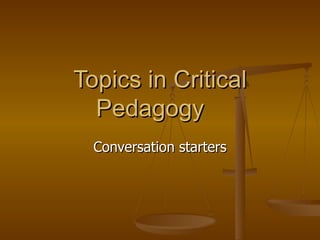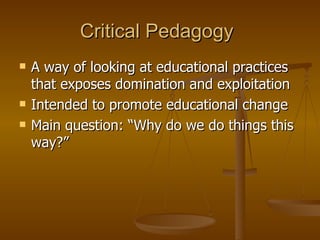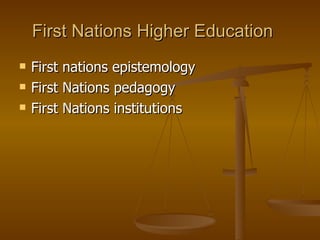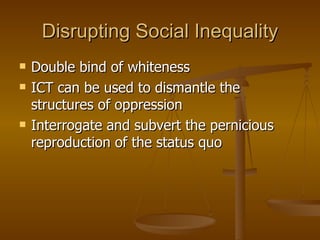Topics In Critical Pedagogy
- 1. Topics in Critical Pedagogy Conversation starters
- 2. Definition of Critical Pedagogy “ Habits of thought, reading, writing, and speaking which go beneath surface meaning, first impressions, dominant myths, official pronouncements, traditional clichés, received wisdom, and mere opinions, to understand the deep meaning, root causes, social context, ideology, and personal consequences of any action, event, object, process, organization, experience, text, subject matter, policy, mass media, or discourse." Shor, 1992
- 3. Critical Pedagogy A way of looking at educational practices that exposes domination and exploitation Intended to promote educational change Main question: “Why do we do things this way?”
- 4. Proponents Paulo Friere, Ivan Illich Henry Giroux
- 5. Web Tools for Conviviality Personal Computers Web based social networking Multi-user virtual environments The Freire Project http://freire.mcgill.ca/user/1204/fbconnect
- 6. The Great White North Critical pedagogy in a Canadian context Conceptualizing “whiteness” Indian Residential schools Carr, P. R., & Lund, D. E. (2007). The great white north?: exploring whiteness, privilege, and identity in education . Rotterdam, The Netherlands: Sense Publishers.
- 7. First Nations Higher Education First nations epistemology First Nations pedagogy First Nations institutions
- 8. Non-natives and First Nations Higher Education The whiteness of Second Peoples The tools of the oppressors Conscientization
- 9. 5 Stages of White Racial Identity Development Conformity Dissonance Resistance and Immersion Introspective Integrative awareness
- 10. Disrupting Social Inequality Double bind of whiteness ICT can be used to dismantle the structures of oppression Interrogate and subvert the pernicious reproduction of the status quo
Editor's Notes
- I’m damned if I make the critique, and I’m damned if I don’t because not doing anything permits the re-production of the racist status quo. I think that in the current historical moment, this double-bind position is unavoidable for White people who want to disrupt racial inequalities. I take some solace from recognizing that my own sense of discomfort with my own complicity is itself a colonial legacy. For now, I remain convinced that working to reveal the mechanics of White dominance is important to anti-racist struggle” ( The Great White North? pgs. 158-159).









